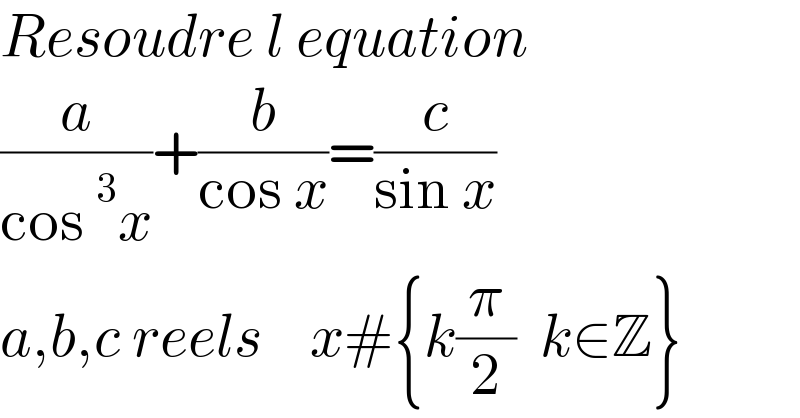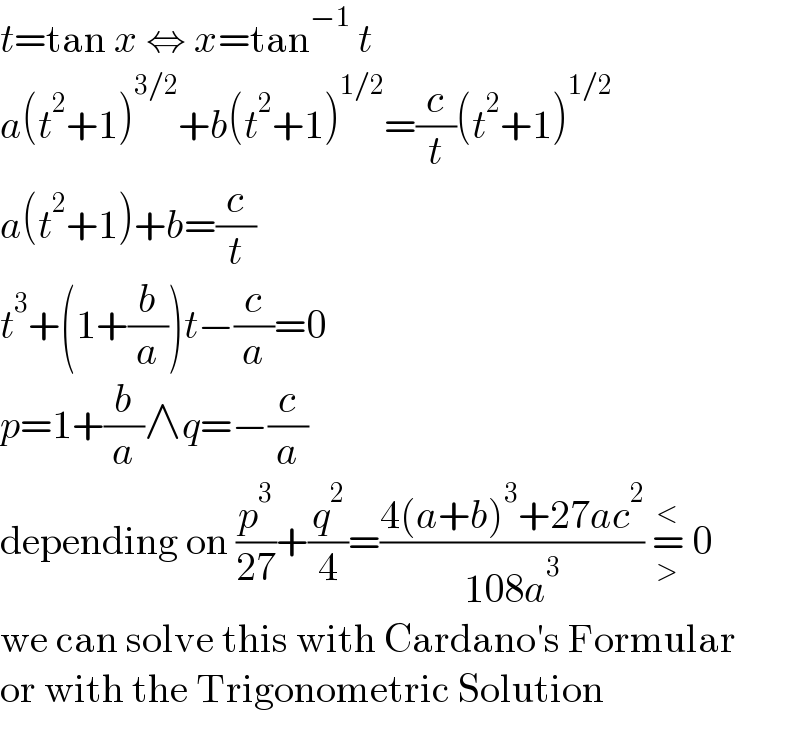
Question Number 177307 by a.lgnaoui last updated on 03/Oct/22

$${Resoudre}\:{l}\:{equation}\: \\ $$$$\frac{{a}}{\mathrm{cos}\:^{\mathrm{3}} {x}}+\frac{{b}}{\mathrm{cos}\:{x}}=\frac{{c}}{\mathrm{sin}\:{x}}\:\:\:\: \\ $$$${a},{b},{c}\:{reels}\:\:\:\:{x}#\left\{{k}\frac{\pi}{\mathrm{2}}\:\:{k}\in\mathbb{Z}\right\} \\ $$
Answered by Frix last updated on 04/Oct/22

$${t}=\mathrm{tan}\:{x}\:\Leftrightarrow\:{x}=\mathrm{tan}^{−\mathrm{1}} \:{t} \\ $$$${a}\left({t}^{\mathrm{2}} +\mathrm{1}\right)^{\mathrm{3}/\mathrm{2}} +{b}\left({t}^{\mathrm{2}} +\mathrm{1}\right)^{\mathrm{1}/\mathrm{2}} =\frac{{c}}{{t}}\left({t}^{\mathrm{2}} +\mathrm{1}\right)^{\mathrm{1}/\mathrm{2}} \\ $$$${a}\left({t}^{\mathrm{2}} +\mathrm{1}\right)+{b}=\frac{{c}}{{t}} \\ $$$${t}^{\mathrm{3}} +\left(\mathrm{1}+\frac{{b}}{{a}}\right){t}−\frac{{c}}{{a}}=\mathrm{0} \\ $$$${p}=\mathrm{1}+\frac{{b}}{{a}}\wedge{q}=−\frac{{c}}{{a}} \\ $$$$\mathrm{depending}\:\mathrm{on}\:\frac{{p}^{\mathrm{3}} }{\mathrm{27}}+\frac{{q}^{\mathrm{2}} }{\mathrm{4}}=\frac{\mathrm{4}\left({a}+{b}\right)^{\mathrm{3}} +\mathrm{27}{ac}^{\mathrm{2}} }{\mathrm{108}{a}^{\mathrm{3}} }\:\underset{>} {\overset{<} {=}}\:\mathrm{0} \\ $$$$\mathrm{we}\:\mathrm{can}\:\mathrm{solve}\:\mathrm{this}\:\mathrm{with}\:\mathrm{Cardano}'\mathrm{s}\:\mathrm{Formular} \\ $$$$\mathrm{or}\:\mathrm{with}\:\mathrm{the}\:\mathrm{Trigonometric}\:\mathrm{Solution} \\ $$
Commented by a.lgnaoui last updated on 04/Oct/22

$${exactly}\:\:\:{same}\:{anser}\:{as}\:{me}. \\ $$
Commented by a.lgnaoui last updated on 04/Oct/22

$${thank}\:{you}\: \\ $$
Answered by a.lgnaoui last updated on 04/Oct/22
![(1/(cos x))((a/(cos^2 x))+b)= (c/(sin x)) ((sin x)/(cos x))((a/(cos^2 x))+b)=c tan x[a(1+tan^2 x)+b]=c tan x(atan^2 x+a+b)=c atan^3 x+(a+b)tan x=c tan^3 x+(1+(b/a))tan x−(c/a)=0 sous forme x^3 +(1+(b/a))x−(c/a)=0 to continue .......... x=tan x x=Arctan (x)+(2k+1)π](Q177342.png)
$$\frac{\mathrm{1}}{\mathrm{cos}\:{x}}\left(\frac{{a}}{\mathrm{cos}\:^{\mathrm{2}} {x}}+{b}\right)=\:\frac{{c}}{\mathrm{sin}\:{x}} \\ $$$$\frac{\mathrm{sin}\:{x}}{\mathrm{cos}\:{x}}\left(\frac{{a}}{\mathrm{cos}\:^{\mathrm{2}} {x}}+{b}\right)={c} \\ $$$$\mathrm{tan}\:{x}\left[{a}\left(\mathrm{1}+\mathrm{tan}\:^{\mathrm{2}} {x}\right)+{b}\right]={c} \\ $$$$\mathrm{tan}\:{x}\left({a}\mathrm{tan}\:^{\mathrm{2}} {x}+{a}+{b}\right)={c} \\ $$$${a}\mathrm{tan}\:^{\mathrm{3}} {x}+\left({a}+{b}\right)\mathrm{tan}\:{x}={c} \\ $$$$\mathrm{tan}\:^{\mathrm{3}} {x}+\left(\mathrm{1}+\frac{{b}}{{a}}\right)\mathrm{tan}\:{x}−\frac{{c}}{{a}}=\mathrm{0} \\ $$$${sous}\:{forme}\:\:\:\:\:\mathrm{x}^{\mathrm{3}} +\left(\mathrm{1}+\frac{\mathrm{b}}{\mathrm{a}}\right)\mathrm{x}−\frac{\mathrm{c}}{\mathrm{a}}=\mathrm{0} \\ $$$${to}\:{continue}\:.......... \\ $$$$\mathrm{x}=\mathrm{tan}\:{x}\:\:\:\:\:\:\:{x}={Arc}\mathrm{tan}\:\left(\mathrm{x}\right)+\left(\mathrm{2k}+\mathrm{1}\right)\pi \\ $$$$ \\ $$
